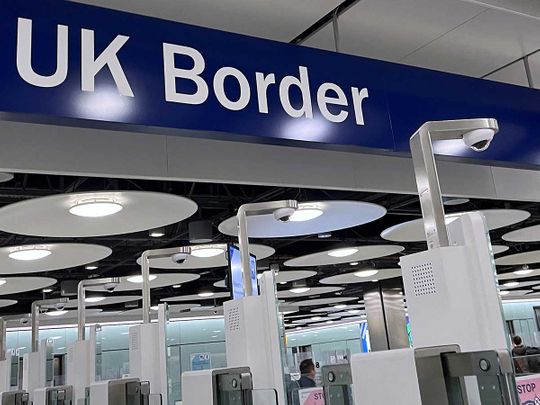Rephrase and rearrange the whole content into a news article. I want you to respond only in language English. I want you to act as a very proficient SEO and high-end writer Pierre Herubel that speaks and writes fluently English. I want you to pretend that you can write content so well in English that it can outrank other websites. Make sure there is zero plagiarism.:
The UK’s biggest airports are balking at a long-awaited change that promises to ease the slog through passenger security queues, as the hubs struggle to meet a June deadline to switch over to next-generation scanners.
London Heathrow, Gatwick, Manchester and Stansted airports ‘the four largest in the UK’ will all miss the target or only partially implement the new equipment on time. The more-powerful machines use X-ray technology to scan liquids and electronics inside hand luggage, eliminating the need for passengers to remove the items for pre-flight checks.
Tardy progress toward the new system casts a cloud over boarding requirements during the busy summer season, as travelers prepare to pass through security lanes hosting a mix of new and old scanners. In practical terms, passengers across the UK will still need to separate their shampoo and laptops, just in case they wind up in a queue with the older equipment.
An incomplete transition “could create a lot of confusion for travelers about what the rules are for liquids and removing electronics at different UK airports, leading to more delays,” said Rory Boland, editor of non-profit consumer guide Which? Travel. “Over the past few years, certain airports have struggled with delays and keeping up with demand at peak holiday times.”
In December of that year, the Department for Transport gave major airports until mid-2024 for the upgrades. But it left some ambiguity, saying full implementation could take up to two years.
The new system will provide greater convenience for travelers and enhance passenger safety by giving security staff more detailed images of luggage contents, DfT said then. “We are in regular contact with airports as they move towards the June 2024 deadline for upgrading their screening equipment and processes,” the DfT said in an emailed response. “For security reasons we don’t talk in detail about aviation security measures.”
Van-sized machine
With the new scanners, the 100-milliliter bottle restriction in hand luggage will rise to two liters, and passengers won’t have to remove liquids and and electronic items to go through security gates. The current restrictions were instituted in 2006, following a terrorist threat.
Testing of the new equipment started in 2018. Still, airports say the June deadline is ambitious, because the work required to fit the larger, heavier, computed-tomogrophy scanners is extensive and complex.
“The existing scanner is like a large domestic washing machine,” Birmingham Airport Chief Executive Officer Nick Barton said in December. “The new machines are the size of a Ford Transit.”
Airports said they’ve had to expand and reinforce their facilities to accommodate the scanners, with Birmingham installing four heavy-duty lifts to move them up to the security area on the first floor. Nevertheless, the West Midlands hub is on track to have the machines in place by June, Barton said.
Gatwick Airport, the UK’s second-largest after Heathrow, has pushed back on the deadline because of concerns about disrupting passengers during the peak summer travel season, Director of Development Bronwen Jones said in an interview.
“Let’s not be working on this into the busy summer period, because we’re worried about putting passengers first,” Jones said.
Passenger disruption
Gatwick officials have told the DfT that it could meet the deadline but would prefer to introduce all 19 scanners across its north and south terminals in phases to avoid creating disruption, she said.
The airport installed two new scanners before Christmas and plans to install another two at the end of this month. But it’ll take until the first quarter of 2025 to finish the major logistical improvements needed to install the remainder of the machines.
London Heathrow, meanwhile, won’t have all its scanners in place until mid-2025, Bloomberg News reported previously. The hub, which handled 79.2 million passengers last year, is among the largest in Europe.
Many of the security lanes at London Stansted, Manchester and East Midlands Airport will have the new scanners in place by June, said Manchester Airport Group, which operates the facilities. It expects the project to be fully completed next year. Some hubs across Europe, including Frankfurt in Germany, Amsterdam’s Schiphol and Milan’s Malpensa, have already installed similar security scanners.
Others, however, still require passengers to separate liquids and electronics. This sets the stage for travelers to carry a 100 millileter bottle of perfume out of one airport with ease, while being unable to do the same on the return trip without checking luggage.
London Luton Airport said it expects to be ready for the June deadline, while smaller airports such as London City Airport have already finished switching to the new scanners.

I have over 10 years of experience in the field of cryptocurrency and blockchain technology. I have attended numerous conferences and events around the world, and my work has been featured in major publications such as CoinDesk, Bitcoin Magazine, and Yahoo Finance.

